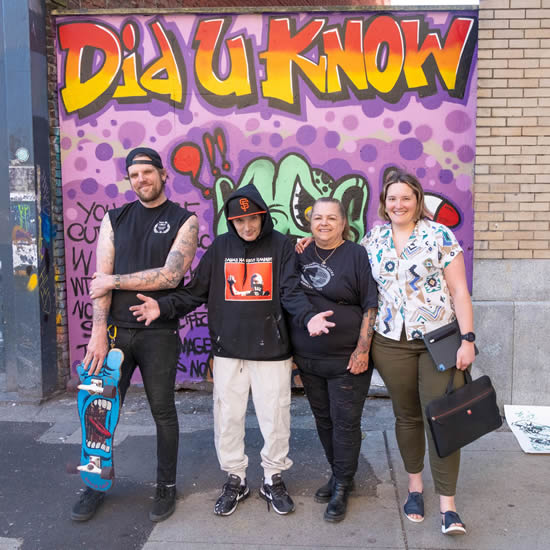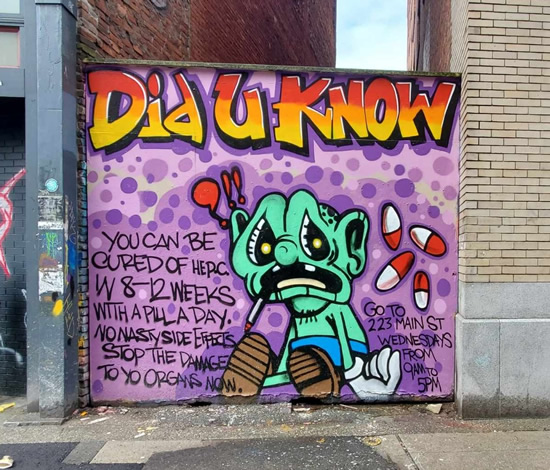BCCDC teams up with Vancouver street artists to promote hepatitis C treatment
A mural on the Downtown Eastside warns about the damage hep C can do to people's organs and encourages them to seek more information and treatment.
DTES street art raises awareness
for Hep C treatment
May 17, 2023 — A new mural in Vancouver’s Downtown Eastside is raising awareness about easily accessible treatments for hepatitis C.
Sofia Bartlett, senior scientist for Sexually Transmitted Infections & Blood-Borne Infections (STIBBI) at the BC Centre for Disease Control (BCCDC), teamed up with Vancouver graffiti artists Smokey Devil and Trey Helten to find a creative way to let people know the curative treatments are free, come in pills, and have no side effects.
“By having something engaging like street art murals, it’s a great way to get the conversation going," said Bartlett.
Widespread infection
Hepatitis C is the most prevalent chronic viral infection in Canada and a major cause of liver disease and mortality resulting from liver disease. New medications to treat it have been available in B.C. since 2018, and there are no restrictions on eligibility.
“Without treatment, the majority of people [who have hep C] develop cirrhosis and other forms of liver damage,” Bartlett explains.
Bartlett says hep C treatment used to be invasive, painful and lengthy, which meant many people living with the condition avoided seeking help.
Today, people who contract hepatitis C in B.C. can get a prescription for Direct Acting Antivirals, or DAAs, and the treatment is covered by B.C. Pharmacare.
“But because the medication’s only been around for a little while, people don’t really know about it yet,” Bartlett added. “We’ve seen Hepatitis C treatment numbers dropping in B.C. in recent years.”

Trey Helten, Smokey D, Pam Young and Sofia Bartlett stand in front of a mural created to provide info about hep C treatment to people in Vancouver's Downtown East Side.
Reaching the community
The Hep C mural is located at 488 Carrall Street near the corner of East Pender Street.
Artist Smokey D says the owner gifted him the stretch of plywood that covers an alley between two buildings, and he uses it to post public service announcements highlighting local issues.
Smokey’s street billboards have ranged from a mural about Missing and Murdered Indigenous Women and Girls, to the latest piece on hep C. Smokey’s friend and collaborator Trey Helten says Smokey is the community’s underground street reporter.
Helten is a manager at the Vancouver Overdose Prevention Site who says he used to use drugs intravenously. He was especially motivated to participate in this project because he contracted hep C several years ago, and was surprised to learn about the new ways to treat it.
“We’re very fortunate today that the new treatment that’s available is very painless. It doesn’t have to be a death sentence for anyone," said Helten.
Increasing awareness of DAAs and how to access them, especially among people who inject drugs, or who formerly injected drugs, will be crucial in the efforts to sustain progress towards hepatitis C elimination. Bartlett says people who inject drugs account for 85 per cent of all new hepatitis C infections.
A simple message
Pam Young, the program manager for Unlocking the Gates Services Society, helped develop the messaging behind the mural and tailored it to people living on the Downtown Eastside.
“Just let people know to get tested and that they can be cured in 8-12 weeks,” she said.
“In this community specifically, graffiti really reaches out to people. And with the message being short and direct, it captures people’s attention.”
Bartlett says the ultimate goal of the hep C mural is to create more awareness. Whether someone is ready to access treatment or not, she says it’s crucial they know it’s available, and they know where they can get more information about it.
On May 11th, Action Hepatitis Canada marked the 2nd annual Canadian Viral Hepatitis Elimination Day, coinciding with the release of the Progress Toward Viral Hepatitis Elimination in Canada report for 2023.
The report showed B.C. is on track to achieve most of the viral hepatitis elimination goals set for 2030. But it also warned that if hepatitis-C treatment numbers continue to decline at the current rate being seen in B.C., the province could fall off track.
If you’re interested in learning more about the risks of hepatitis C, and how it can be treated, check out the BCCDC hepatitis C Page.

Graffiti text: You can be cured of Hep C Green cartoon character with red and white pills
Contact
BC Centre for Disease Control
655 West 12th Avenue
Vancouver, BC
V5Z 4R4 Canada
Phone: 604-707-2400
Email: admininfo@bccdc.ca
Source: http://www.bccdc.ca/about/news-stories/stories/2023/bccdc-and-vancouver-street-artists-promote-hepatitis-c-treatment
"Reproduced with permission - BC Centre for Disease Control"
BC Centre for Disease Control
For more HIV and AIDS News visit...
Positively Positive - Living with HIV/AIDS:
HIV/AIDS News |